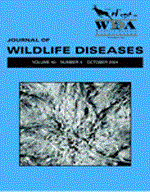During the hunting season of 2001–02, blood and spleen samples from 59 red deer (Cervus elaphus), 77 roe deer (Capreolus capreolus), four fallow deer (Dama dama), and five chamois (Rupicapra rupicapra) were collected from nine hunting districts (n=133) and one deer farm (n=12) in southern Austria. Sera were tested for antibodies against bovine viral diarrhea virus (BVDV) with an enzyme-linked immunosorbent assay (ELISA) and virus neutralization tests against three BVDVs and one border disease virus strain. Reverse transcriptase polymerase chain reaction was used for detection of pestivirus-specific RNA in spleen samples. Antibodies were detected in one serum sample when using ELISA and virus neutralization tests. Results of the virus neutralization tests of this sample provided strong evidence for the exposure to the BVDV-1 genotype. The spleen samples were negative for pestivirus-specific RNA.
How to translate text using browser tools
1 October 2004
Pestivirus Exposure in Free-living and Captive Deer in Austria
Reinhild Krametter,
Søren Saxmose Nielsen,
Angelika Loitsch,
Wolfgang Froetscher,
Viviane Benetka,
Karin Moestl,
Walter Baumgartner

Journal of Wildlife Diseases
Vol. 40 • No. 4
October 2004
Vol. 40 • No. 4
October 2004
Border disease virus
bovine viral diarrhea virus
free-living deer
reverse transcriptase polymerase chain reaction
serologic survey




